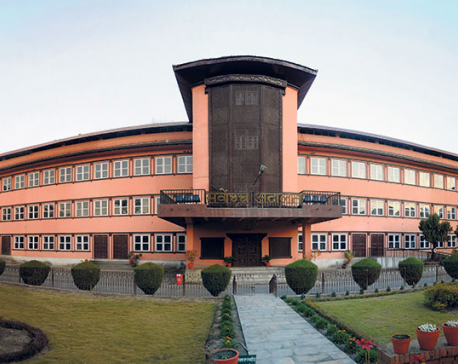
OR
Govt wakes up to pesticide risks in fruits and vegetables
Published On: February 23, 2018 01:45 AM NPT By: Republica | @RepublicaNepal
Decides to fix maximum residue limit, designate customs points for farm imports
KATHMANDU, Feb 23: The government finally seems to have woken up to the fact that increased use of pesticides in fruits and vegetables is affecting human health.
The Ministry of Commerce on Thursday held a discussion on rampant use of pesticides in fruits and vegetables. Officials of the Ministry of Finance (MoF), Ministry for Agricultural Development (MoAD), and Ministry of Livestock Development (MoLD) participated in the discussion.
The meeting concluded that the government must take stringent measures to control the use of pesticides in fruits and vegetables. According to a statement issued by the MoC, the meeting decided to request the MoAD is to fix the Maximum Residual Limit (MRL) of pesticides in fruits and vegetables produced in the country as well as imported from foreign countries.
It also decided to allow import of livestock and plants only from designated custom points of all provinces.
The move is aimed at controlling import of fruits and vegetables with high pesticide residue.
The checkpoints will be designated jointly by the MoAD and MoLD. According to the statement, the designated checkpoints will have necessary infrastructures and manpower to test pesticide residue in fruits and vegetables.
The meeting also decided to take needful initiatives for promoting Good Agricultural Practices (GAP) and Integrated Pest Management (IPM) standards in fruits and vegetables produced and imported in the country.
Ministry for Home Affairs (MoHA), MoF, and the Department of Customs will work in coordination to control supply and import of pesticide-laden vegetables and fruits, the ministry added in the statement.
Though use of pesticides in fruits and vegetables is rampant, little has been done by the government to control use of pesticides. 'No Pesticide Use Week' celebrated in December as an awareness campaign, and Rapid Bioassay Pesticide Residue (RBPR) labs set up by Plant Protection Directorate (PPD) of MoAD were among the notable programs of the government to control use of pesticides.
According to officials of the MoC, the discussion was intended to create a common platform for the government bodies responsible in the process of pesticide control, and encourage integrated action in the issue.
“The discussion was led by the secretary of the Ministry of Commerce,” Ram Krishna Adhikari, an information officer with the MoC, told Republica. “All the government bodies present in the meeting have agreed to include the decisions taken by the meeting in their respective work plans.”
Data provided by the PPD shows that average use of pesticides in the country is 396 grams per hectare. However, crop-wise use of pesticides is very high. One and a half kilograms of pesticide is used in a hectare of land where vegetables farming is done. Similarly, a 2.1 kilograms of pesticides is used in per hectare of tea garden.
Nepal imported 1,629 tons of pesticides and insecticides in FY2013/14. The import of such chemicals further rose to 1,738 tons in FY2014/15. In 2015/16, however, such imports fell slightly to 1,640 tons.
You May Like This

Process to procure pesticide testing machines has begun: Ministry
KATHMANDU, July 7: Government officials have said the installation of well-equipped labs at least at the six major border customs points... Read More...

SC tells govt to restrict pesticide use in vegetables
KATHMANDU, Jan 31: The Supreme Court has directed the government authorities to restrict the use of pesticides in vegetable cultivation as... Read More...

SC continues order to test vegetables, fruits for pesticides
KATHMANDU, June 17: The Supreme Court on Tuesday continued its July 10 stay order directing the government to conduct pesticides residue... Read More...







Just In
- 19 hydropower projects to be showcased at investment summit
- Global oil and gold prices surge as Israel retaliates against Iran
- Sajha Yatayat cancels CEO appointment process for lack of candidates
- Govt padlocks Nepal Scouts’ property illegally occupied by NC lawmaker Deepak Khadka
- FWEAN meets with President Paudel to solicit support for women entrepreneurship
- Koshi provincial assembly passes resolution motion calling for special session by majority votes
- Court extends detention of Dipesh Pun after his failure to submit bail amount
- G Motors unveils Skywell Premium Luxury EV SUV with 620 km range










Leave A Comment